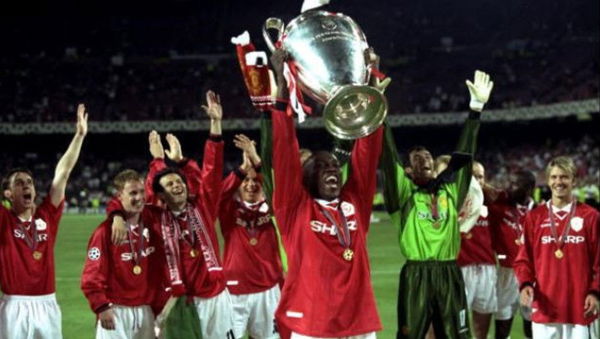

The UEFA Champions League, known simply as the Champions League,is one of the most prestigious tournaments in the world and the most prestigious club competition in European football. Introduced in 1992, the competition replaced the European Champion Clubs’ Cup, or simply European Cup, which had run since 1955. The competition has been won by 22 different clubs, 12 of which have won it more than once. Since the tournament changed name and structure in 1992, no club has managed consecutive wins. Here we look at the top UEFA Champions League runs :
5. Borussia Dortmund 1996-97:
ADVERTISEMENT
Article continues below this ad

Having won the Bundesliga twice in a row now, the German champions were a good side coming into the season. But this season was also the one where the defending champions, Juventus, had players like Zidane, Del Piero, Christian Vieri and Didier Deschamps. A team which disposed the English champions Manchester United twice in the group stages. Dortmund having braved Atletico Madrid in the group stages saw off Auxerre in the quarter finals with an impressive 4-1 aggregate victory. Then came the task of playing Man Utd, who had demolished FC Porto 4-0 aggregate in the quarters, in the semis. But the German side proved to be the better with 1-0 victories both at home and away. Juventus also reached the final and were heavy favourites to lift the cup again. Against all odds, Dortmund lead 2-0 at the break. Del Piero pulled one back for the Italian giants but then 16 seconds after coming on, Lars Ricken, the 20-year-old who was the hero of the season, sealed the tie with a delightful chipped goal which was his first touch of the ball. And Dortmund were crowned Kings of Europe for the first time.
4. Real Madrid 2013-14:

The only blot on this delightful cup-winning run was the 2-0 defeat to Borussia Dortmund. An otherwise unbeaten run to cup, this season saw Madrid’s talisman, Cristiano Ronaldo, break the record for most goals in a Champions League campaign with a tally of 17 goals. In the group stages Real Madrid overcame Galatasaray, FC Copenhagen and Juventus. The Spanish side then demolished FC Schalke 04 6-1 away from home and 3-1 at Estadio Santiago Bernabeu to win 9-2 on aggregate. Working past a scare in the form of Dortmund, who they won against 3-2 on aggregate, Madrid met Bayern Munich in the semi-finals. The team who had eliminated them at the same stage two seasons ago. But Real Madrid rose emphatically to the occasion to see them off 4-0 at Allianz-Arena, courtesy of braces from Cristiano Ronaldo and Sergio Ramos rehabilitating himself after the penalty miss from two years ago. A Madrid Derby for the final, Atletico had disposed of Chelsea to book their places in the final. A Diego Godin goal in the 36 minute brought Atletico the lead which they were able to maintain until the final minutes of stoppage time. A thundering header from Ramos made the game to continue for extra time in which the famed Madrid strike force- Benzema, Bale and Ronaldo, all scored a goal apiece. This brought the Madrid side the ‘La Decima’.
3. Chelsea 2011-12:

Chelsea became the first London team to lift the European Cup trophy and that too on runners-up Bayern’s home ground too. In a season where the club couldn’t even manage to book a place in European championship (they finished 6 in the Premier League), against all odds, they won the FA Cup and the Champions League. Under Andre Villas Boas, the club managed to top a group which contained Bayer Leverkusen, Valencia and Genk. In the Round of 16, Chelsea met Napoli, the first leg of which was played in February, in Naples which Chelsea lost 3-1. In March, AVB was sacked just days before the second leg after the club lost against West Bromwich Albion in a domestic fixture. This made the assistant coach Roberto Di Matteo the interim manager. In the second leg now, Chelsea, at home, won 4-1 to win 5-4 on aggregate. Then they saw Benfica off in the quarters to meet Barcelona in the semi-final. In the first leg Chelsea won 1-0 at home, but in the second leg, in front of approximately 96k fans in the Camp Nou, John Terry was sent off in the 37 minute, Busquets and Iniesta scored in the 35’ and 43’ minute. Ramires pulled one back just before the halftime whistle to make it 2-1. Petr Cech saved a Messi penalty and Fernando Torres scored in the stoppage time to end the match at 2-2, meaning Chelsea advanced to the final. Bayern Munich who were going to play the final at home were dubbed stark favourites to win against a not so good looking Chelsea side. But it took Bayern 83 minutes to take the lead through Mueller, only to be thwarted by a thumping goal from Drogba in the 88 minute. In extra time, Cech again became Chelsea’s hero by saving a Arjen Robben penalty keeping the score 1-1. Chelsea went on to ride on Cech’s back in the penalty shootout to win 4-3 on penalties. This meant Chelsea completed a cup double even after their dismal performance in the Premier League.
2. Arsenal 2005-06:

Arsenal qualified for the group stages on virtue of finishing runners-up in the Premier League the preceding season. They were drawn in Group B, along with Swiss’ Thun, Sparta Prague and Ajax. In spite of Van Persie’s dismissal against Thun in the opening group match, Arsenal won 2–1, courtesy of a late goal by substitute Bergkamp. A 2–1 win against Ajax was followed by a 2–0 victory against Sparta Prague; Henry scored both goals to surpass Ian Wright’s all-time leading scorer record. A goal from Henry and two from Van Persie in the reverse fixture meant the club reached the knockout stages. A win at Thun on 22 November 2005 ensured Arsenal topped the group; they ended the group stages with a draw at Highbury against Ajax. The club faced Real Madrid in the Round of 16 – the first encounter between both clubs in the competition. A solo goal by Henry at the Estadio Santiago Bernabéu in the first leg, inflicted the home team’s first defeat in 18 Champions League matches. A goal-less draw at Highbury helped Arsenal to reach the quarter-finals and become the sole English representative left in the competition. A 1-0 victory at home and a goal-less draw away ensured Arsenal’s appearance in the final. An Arsenal side which nobody expected to go very far in any competition were the only English side left in the Champions League. Arsenal overcame Juventus 2-0 on aggregate, both goals scored at Highbury, by Henry and Fabregas to meet Villareal in the semis. Arsenal defied the odds to reach the Champions League final. The Arsenal squad wasn’t one which could be considered elite and their results elsewhere absolutely made the statement a fact but their performances in the European championship surely instilled respect for them amongst viewers. In the final, Arsenal keeper, Jens Lehmann, became the first ever player to be sent off in a Champions League final, after he was dismissed early in the first half. Despite their numerical disadvantage, Arsenal took the lead through Sol Campbell and held on to it until the 75th minute. Henrik Larsson’s introduction for Barcelona changed the game and the Swede set up two goals in five minutes, with Samuel Eto’o and Juliano Belleti finishing the net, to turn the game on its head and give Barcelona their second European triumph.
1. Manchester United 1998-99:
ADVERTISEMENT
Article continues below this ad

ADVERTISEMENT
Article continues below this ad
The most successful season in the history of the club, they completed the Treble after a season without trophies. Manchester United were drawn into the ’Group of Death’ alongside Bayern Munich, Barcelona and FC Brondby. But a squad with players like Ryan Giggs, David Beckham, Paul Scholes, Peter Schmeichel, Andy Cole, Dwight Yorke, Denis Irwin, Gary Neville, Teddy Sheringham, Nicky Butt, Ole Solskjaer and Roy Keane were sure to qualify. The Danes surprised Bayern in the opening game with a 2-1 win but lost their five remaining matches. Although United won vehemently against Brondby in both fixtures (5-0 and 6-2), they drew 3-3 twice with Barcelona and also drew twice with Bayern to gain a best runner-up spot behind the Germans who beat Barca twice to win the group by a point. Man Utd then went on to dispose Internazionale 3-1 on aggregate in the quarters to meet Juventus in the semi-final. The first leg, played in Italy, saw United trail 1-0 till the final minutes of the game when Ryan Giggs stepped up and scored making it 1-1 at full time. In the second leg though United showed Europe why they were the kings of comebacks as they upturned Juventus’ 2-0 lead (both scored by Pippo Inzaghi) to win 3-2 at Old Trafford with goals from Keane, Yorke and Cole. If Manchester United’s comeback against Juventus was dramatic, their recovery in the final against Bayern Munich was even more remarkable. In only the 6 minute, United were trailing 1-0 in a jam-packed Camp Nou. The game continued to be intense but there was no goal till the 90 minute where Teddy Sheringham scored to equalise from a David Beckham corner. Even Schmeichel had come forward. United immediately forced another corner from which Solskjaer took his chance to blast the ball into the back of the net to bring the third trophy of the season to Manchester. One of the most crunch finals ever saw Manchester United become champions of Europe for the second time.
ADVERTISEMENT
ADVERTISEMENT
ADVERTISEMENT
ADVERTISEMENT

